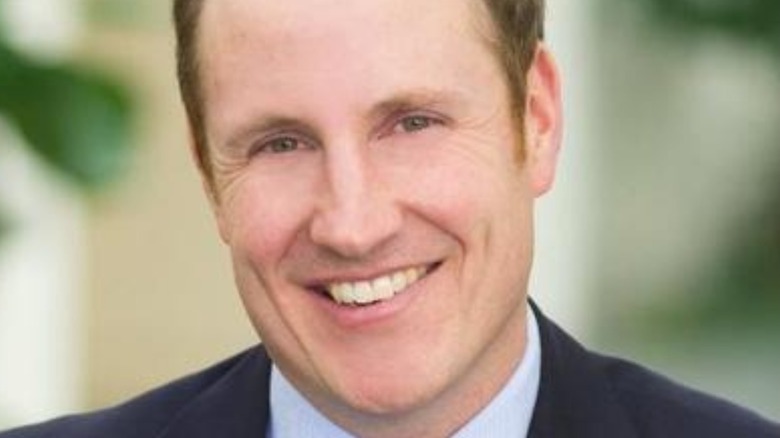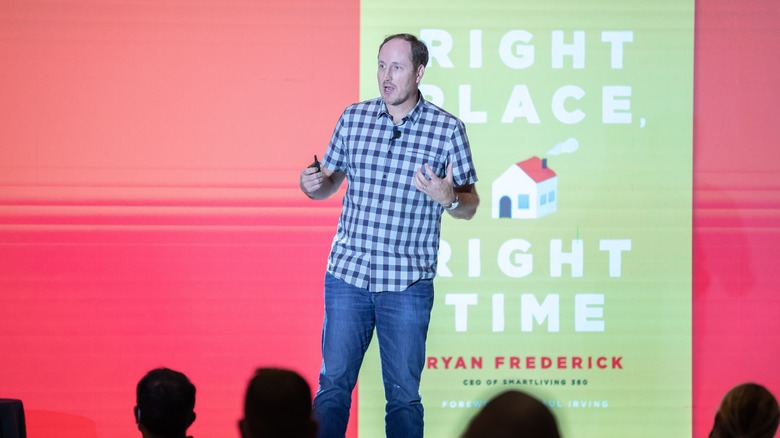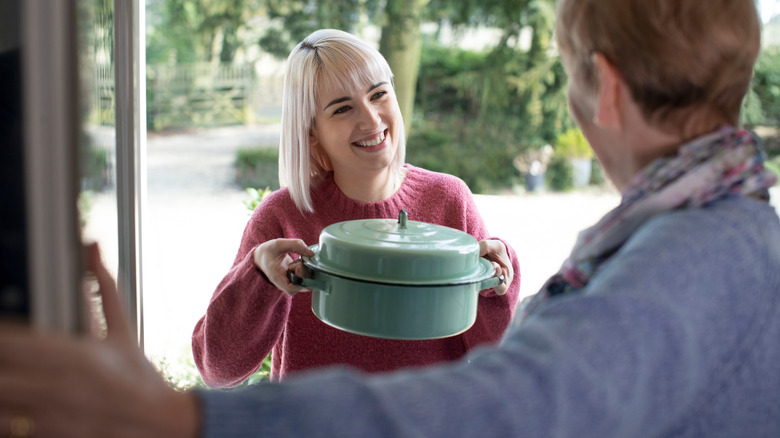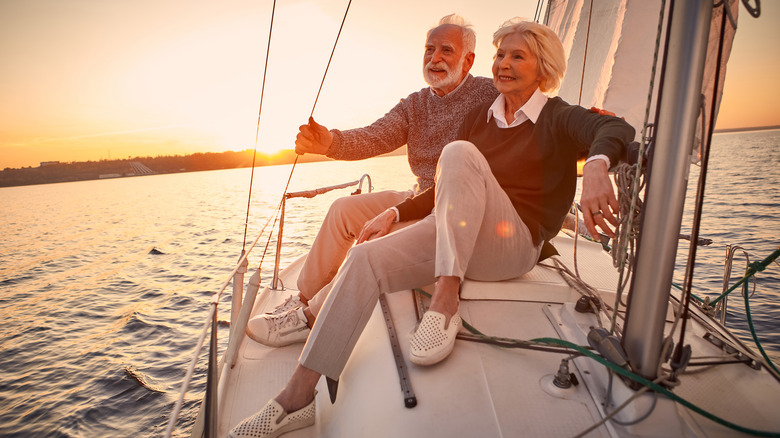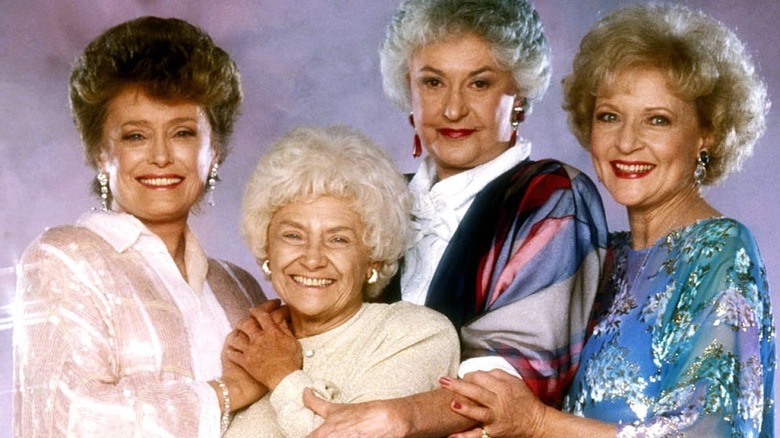Longevity Expert Ryan Frederick Explains The Role Of Housing In Healthy Aging - Exclusive Interview
We may receive a commission on purchases made from links.
If you haven't spent much time contemplating the intricacies of the environment in which you live, you might be missing out on one of the major keys to healthful aging. Health Digest had the pleasure of sitting down with Ryan Frederick, longevity expert, CEO of SmartLiving360, and author of the newly-released book, "Right Place, Right Time: The Ultimate Guide to Choosing a Home for the Second Half of Life," in which he discusses the idea of "place" and how it relates to aging well. Frederick earned his MBA from Stanford Business School before turning to longevity research, and he currently serves on the National Advisory Board of the John Hopkins University of Nurses.
Through his work, he breaks down some of the fundamental pieces that play into planning well for our futures, including elements like securing housing that serves your needs in an area that makes sense for you, and recognizing that our needs change as we age. With a moderate amount of planning and the flexibility to ride the natural waves of life, we might all be able to enjoy our lives in the right place at the right time.
In this exclusive interview, Frederick outlines how vital a social network and a sense of purpose are, especially for aging adults. Executing this advice takes some planning, but Frederick's steps are simple and intuitive.
The motivation behind 'Right Place, Right Time'
What was your motivation behind writing "Right Place, Right Time"?
Ally, the master plan for me never involved writing a book. I studied engineering in college to avoid reading and writing. I found in the work that I've been doing, for about 15 years now in this intersection of healthy aging and the role of place ... that people didn't necessarily know how important the decision is. I'd get all these questions from friends and family: "I'm not sure if my house is the right thing now. How should I think about it?" I could tell that there was an opportunity for people to think more deeply about it.
Then, I also got to think about it more personally — we moved from the Baltimore area to Austin a couple of years ago. As we thought about just how place influences our lives — that also was a motivator for thinking more deeply about the subject.
Generally speaking, I just felt like it's a more important thing than most people realize when they're mapping out a healthy, longer life. I committed to writing the book before the pandemic, then after the pandemic put a spotlight on this issue.
Downsizing versus 'right-sizing'
What kind of trends have you seen in your research with the people who choose their second-half-of-life housing wisely?
Well, I think about what I've seen, one of the trends, first of all, is people just taking a step to plan and envision and dream. Not everyone can choose where they want to live, but sometimes, we have more options than we realize if we take a step back.
One of the trends is people just recognizing that this is important and then trying to have a plan about it. One of the trends with people living longer now is that you have these additional chapters in life. You start to have this opportunity. If I'm living where I've been for decades in a single-family house in a suburban area, that's not the case for everyone, but for a number of people, it is. Then think, "Is this really the best place for me to live out these extra chapters?"
I think one of the trends that's happening now is that you're seeing more people ask this [question], "Where do I want to go?" Then you're seeing more people act on it. You're seeing some people decide to downsize or "right size," which some call it, from a larger environment to maybe an apartment or a condo in a walkable area, where they have more amenities close to them. It is easier to see people on a regular basis. That's one trend that's happening.
Another trend that was happening — before the pandemic but probably accelerated with the pandemic — is people potentially not downsizing, but actually maybe even getting more space, but in a less crowded spot. Then they can design a house that works for them, perhaps empty nesters, but then have the capability for family or friends to stay with them in a way that maybe their single-family house wasn't necessarily designed to host people as easily or as readily.
Changes during the work-from-home boom
Working from home has encouraged some people to re-examine their environment.
[A] more recent trend is related to just the changing work that's happening now. You don't have to be as tethered to where you work compared to before, where you had to have that daily commute. I know as a society, we're sorting that out right now. Still, I think, particularly for people in the second half of life, there are ways they can engage in work or even volunteer activity that they can take advantage of Zoom, whether it's audio or video.
I think that's freeing up some of the geography constraints, as well. I think you're seeing more people saying, "Wait a second, I'm living longer. There are more chapters. What do I want these chapters to look like?" At the same time, you're then seeing more people act on that saying, "I want to be in a different environment."
I think another element, I would say, is that we are seeing some regions of the country, some metropolitan areas, fare better through the pandemic than others. You can see it in the demographic patterns. You're seeing people move away from California or move away from New York. You're seeing inbound population growth in Florida, Texas, and Colorado. A number of things that were happening before, I think they've really accelerated here during the pandemic. There's a lot of people making these decisions.
Then at the same time, it's not just moving for older people, it's not necessarily even moving to a "retirement community." There are plenty of people moving into just conventional housing or apartments or things like that. You are seeing a growth of accessible dwelling units (ADUs). People having cottages, you're seeing a number of municipalities where they're making that easier to do now.
Minneapolis, Minnesota is one of the first to do that in scale where they really, I want to say about three-quarters of the city was just single-family house zoning. They eliminated that so people could have duplexes or triplexes or quadplexes or add these ADUs. You're also seeing planners make it more possible to have other types of housing.
Longevity is linked to social connections
What do you think the first step is when you're starting to plan ahead for second half of life housing?
I think the first thing is to take a step back and say, "What do I want this longer life to look like?" Knock on wood, it doesn't happen for everyone, but ... I would say, arguably, the biggest accomplishment of the 20th century is that life expectancy more or less doubled in the U.S. You're seeing some of those same trends continue here in the 21st century, particularly for those who are educated and have some resources. You take the pandemic aside for a moment — which will likely just really be a blip in this longer trend — [and] the first thing I recommend is taking a step back and saying, "This is a longer life. What do I want it to look like?" Leaning into some of that visioning and planning. Also, recognizing that longevity is much more linked to this lifestyle, these decisions, and the role of environment than it is to genetics.
Only about 30% of our longevity is linked to genetics. It's much more about purpose and social connection. Being physically active, financially prepared, and then having this connection to place. Those are much more significant drivers in your longevity. It's taking a step back and getting a sense of, "Where do I fall across these different measures?" In chapter three [of "Right Place, Right Time"], I have a series of questions and help people do a little self-assessment of where they are along those different measures.
You might love your physical house, but you might find that you're socially disconnected. ... For those that are chronically lonely, it has the health impact of having about 15 cigarettes a day. You have these other elements and a similar thing for purpose. People who don't have an articulated purpose that's greater than themselves are two and a half times more likely to suffer from mild cognitive impairment or dementia in the future. A lot of these elements really do matter in your health trajectory.
"Place" plays an important role, Frederick explains.
Then when you get to the place piece, something I talk a fair amount about is making sure we take this somewhat abstract term "place" and be more specific about it. Place is the four walls of your physical environment, but it's a lot more than that. It's what neighborhood you are in. What metropolitan area are you in? Are you in a rural, suburban, urban area? What state, what region of the country, and even what country? What I've done sometimes to exaggerate to make the point, you might live in a beautiful house in Afghanistan. Still, it's probably a pretty awful place right now in light of everything that's going on. You have to look at it in its composite to make sure you think about place broadly enough.
Finding a sense of purpose
I was touched by the story of your friend, Charlotte, in your book. Her story was really powerful. I think that through the pandemic, a lot of people felt, and continue to feel, a little bit adrift. I wondered if you have any advice for helping people find their sense of purpose?
In the first half of life, you might have purpose that comes from that job. It might come from relationships that are important to you — maybe raising kids. It can come in the context of caring for older parents or loved ones. [It] could come in the form of getting more involved in your community, or cause that you really care about.
I think what gets a little more complicated about the second half of life is there really isn't a playbook because the word "retire" means to withdraw. I recall a couple months ago when the baseball playoffs were going on the announcer was talking about a batter who hit a fly ball to the outfield and the outfielder caught the ball for now. Then the announcer said that batter is "retired" — wiped off of the field is if they don't exist. Part of it is as we look at the second half of life is that term "retire" can do a disservice to us because it can sometimes mean that we don't matter. We're effectively off the playing board. I think one of the first things about purpose is to be able to reflect a bit on: What are these things that you care about? What are the values that you hold? Then trying to identify real tactical ways in which you can put your energies behind them.
Again, it could be your primary career. That's a bit of what Charlotte story is [about]. It could be an encore career where you find a different field. Perhaps a different avenue where you can use some of your professional skills for a cause that you can identify with. It can come in the form of just ways to get more involved in your local community. No doubt in our society today, there's a lot of local needs that we need local people to get involved with. It could be the rotary group ... it could be a place of worship, a number of different things, so there's a lot.
I would say it starts with this recognition that it requires some self-reflection. Then, I would even say learning about what you have found purpose in historically because that can help you with the direction in the future.
One caveat, I would say, is sometimes grandparents want to put a lot of purpose into being around their grandchildren, which is great. Although sometimes, it can get complicated if their desire doesn't necessarily map up the availability of those grandchildren, or even the preferences sometimes of the parents. Some purposes you might have are easier to act on than others.
Relationship dynamics play a role
What do you think the optimal housing situation is for a couple with grown children, and how does that change versus a single aging person potentially with no children?
I think, as I talk a bit about in the book, I think that it's almost like every situation's a snowflake because everyone's circumstances are different. Your preferences are different and their constraints are different, but in broad strokes, I think when you have a couple, it can be both better and more complicated.
As a couple, it means that you need to map your preferences together and often have compromises. One person might want a lot of space; another may not want much space. You'll have to decide how to map that out in a way that works for everyone. That's down at the level of a particular dwelling, but you have bigger issues like, where in the country or world do you want to live? One person may desire warmer weather; another person may not. I think there is an important conversation between the couple to think about what they want these future stages to look like. I think there's an important conversation about how much space you really need.
That space comes with a cost. It comes with a cost in terms of buying or renovating that space. It comes in the form of associated real estate taxes for that space. If you own it, it comes in the form of utility expenses, furnishing expenses. There can be some real consequences, and those extra dollars you might have can be reinvested in other ways — either to satisfy other interests you have or just to provide a greater level of financial well-being. I think there's an element there where just talking through what that means is significant, especially in this era of hybrid working on Zoom, because people might need to have their workspaces in a way that we didn't necessarily have to have historically.
Also, I think it's important to understand the couple's health condition. If both are healthy, that's one circumstance. If there are some preexisting health conditions, that also is something to think about in terms of your housing, particularly if there's a concern about mobility issues. Understanding maybe there should be a greater preference towards finding one-story living. That can either be a ranch house or an apartment or a condo where there's an elevator.
When you shift to someone single, which will be an increasing number of people when you look at the boomers, who have either never been married, divorced, or widowed, it's just a bigger number.
The Golden Girls were onto something
Connection is important for aging singles and couples alike, according to Frederick.
I'd say that the social connection piece is really significant, and it's important for couples too. It's absolutely critical for them too, but there should be a little bit of an ability to lean on each other in a way that if you're living alone, you don't have. It becomes even more important in my view to really think about that social fabric. Who are those people you invest in, and who also invest in you?
Ideally, it's not just a series of one-on-one relationships. It's great if, somehow, these relationships are webbed together. Maybe it's a walking group, maybe it's a group that's involved more broadly in the community, maybe a community through a place of worship. That's a bigger factor because there's less support structure when things get harder when you're single.
If you're single without kids or your kids live far away, that becomes even more important. You have to be pretty thoughtful about the design, too. If you're in a spot that you love to be in for a long time, what might that look like if your health condition changes?
One trend I've been seeing is that people are considering having roommates like "The Golden Girls." I talk a bit about what Silvernest does and others where you have an extra bedroom or maybe an ADU [accessible dwelling unit] in the back. Are there ways to rent out some of that space or consider it to both help with your financial well-being? Also, ideally, if you can get a friend or an acquaintance in the process, that can help everyone. I think it's riskier when you're alone, and you need to think about that in terms of what the right place is.
'Part of being healthy is planning and developing good daily habits'
Some people neglect to plan ahead, and they live paycheck to paycheck because of this or because of unforeseen circumstances. Do you think there's a tipping point when it becomes too late to find optimal housing?
Part of being healthy is planning and developing good daily habits. Do I think there's a point where it's too late? No, not necessarily. However, not planning and deferring — this has real consequences.
For example, and this is actually not [an] unusual circumstance, what can happen is people decide to stay in the houses they lived in for a while. A common term is "aging in place." I'm not very fond of the term. I talk about that a bit in the book — I think it's better to think about it in terms of living in a community.
Part of this is if you do have situations where people live in a place where they are isolated for too long, they live in a place where it's not a good fit for their physical needs. If they're not like physically active, all of those things, they don't have purpose on a regular basis. All those things just increase the odds of a bad health event, whether it's a fall or a stroke or things like that.
When you do have a health event and you're not in the right spot, that can trigger an event where you then have a pretty sizeable change. You may have been in your single-family home, in this example. All of a sudden, you might find yourself in more of an institutional care environment because that's what is really best suits you at that point, in part because there's such a gap between where you used to be and what your needs are today. That is probably a situation where it's too late to make a more positive change in your place.
Do you think, [in a financial sense], that finding optimal housing is out of reach for some people? Can we all pursue it equally?
I think it depends how do we define optimal housing? ... One of the things I talk about in the book is it does require some measure of financial acumen because when you own a house, for example, there's equity. For most people, particularly older adults, there's some equity in their house. That equity can be pretty valuable, but they haven't necessarily tapped into it. ... In some of those situations, you might be better off selling your house and taking those proceeds and investing them in a more diversified way for a higher return and then renting a place.
You're seeing one of the trends I didn't get into earlier: you're seeing more of a market now for single-family rental housing. You're able to take some of that capital, reinvest it, and then you're more diversified, which is I think particularly important as you get older. I think that there are strategies as it plays out that can help just give you more options.
As you think about what might be optimal, I think that's part of just creating more options. Options can be living in different geographies. Options can be different price points. Options can be considering rent versus a for sale situation.
It's a little bit of a gradation. It's not necessarily a binary thing — either you can go after optimal housing or you can't. I think there's gradations of that conversation. It starts with this realistic assessment of 'what do I want my life to look like and how financially prepared am I for that?'
Tools for designing your life
Ryan Frederick explains how to use "design thinking" to design your life.
I'm creating a digital version of that on the Smart Living 360 website. It's in the beta form right now. We're hoping to get it live on the website next week. What it does is you take these bigger ideas like ... where are you really with purpose? Where are you really with social connection and physical well-being and financial well-being, and then place? What it'll do is provide a dashboard when you answer these 20 or so questions [and] then allow you to visually see along with some suggestions: "Well, here's some ideas if you have gaps in your life."
That's one thing, I think that's been a valuable tool in the book and then now making it more available for people to dive into a digital form. Then the second thing is I talk a bit about this innovation term called "design thinking," which is used in some innovation circles, but I apply that to our own lives and it's pretty simple. It's like I have a hypothesis, something I believe that may be true or worth testing and then I try it. Then I see if what I think was true about it really is true. In most cases, there's something you learn in the process and then you pivot, make some changes, and you create a new prototype of the idea.
That design thinking approach is particularly important as we think about place, because when we make big changes with place –sometimes those decisions are irreversible. When you sell your house and decide to move to Hawaii, let's say, that sounds awesome. That could be amazing, but maybe what you think it's going to be, and what it is could be different.
Where we live in Austin, [we have an] acquaintance — they're empty nesters, they were pretty drawn to living. He works downtown, he's a lawyer. They thought it'd be fun to downsize and just walk to work and walk to restaurants. They pulled the trigger, sold their house, and bought a condo downtown. The first three months, I think they loved it. Over time, they just found it really hard to connect with friends. They found my friend's wife missed having a garden to tend to, even if it was a small one. They started to have reservations — really, regret — about the decision so they ended up selling their condo and then moving back this same neighborhood, but it was a pretty costly thing for them along the way.
I think they would've been better suited doing an Airbnb for a long weekend or a week downtown or a month. Even probably best would've been renting their house and then renting something downtown for a year. Then being able to say, "Is this life what we think it is?" I think as we make bigger decisions around place ... there's a really important role for design thinking. Taking smaller bets and see if they really are what you think they are before making a really big irreversible bet.
'Places change and people change'
If you could just leave us all here with one piece of mic drop-worthy information for finding the perfect situation housing-wise for the second half of life, what would it be?
Well ... it starts with really understanding how significant this decision is. If you care enough to watch what you eat, exercise more regularly, and save money, then this decision of place should be on that same pedestal. It's that significant for living a long, healthy, and financially-secure life.
You should also think about it as not a one-and-done solution. Places change, and people change. You might have an address that you've lived in for decades, but it's likely that environment, the house, or the place, and thus the environment around you, has changed. At the same time, the person has likely changed too — your needs, your desires. I think it's such a big decision, but it's not a one-off decision. You're constantly, or at least every so often, are really calibrating and recalibrating to decide, "Am I really in the best place for now?"
I think that, maybe, one of the key things in all of this [is] it's a huge decision and then having this discipline to really take stock of your life and say, "Am I in the best place for me to thrive in this next chapter of life?"
For more information on Ryan Frederick please visit www.smartliving360.com and be sure to follow him on social media: LinkedIn, Twitter, and Facebook. And don't forget to order your copy of "Right Place, Right Time: The Ultimate Guide to Choosing a Home for the Second Half of Life" on Amazon.

